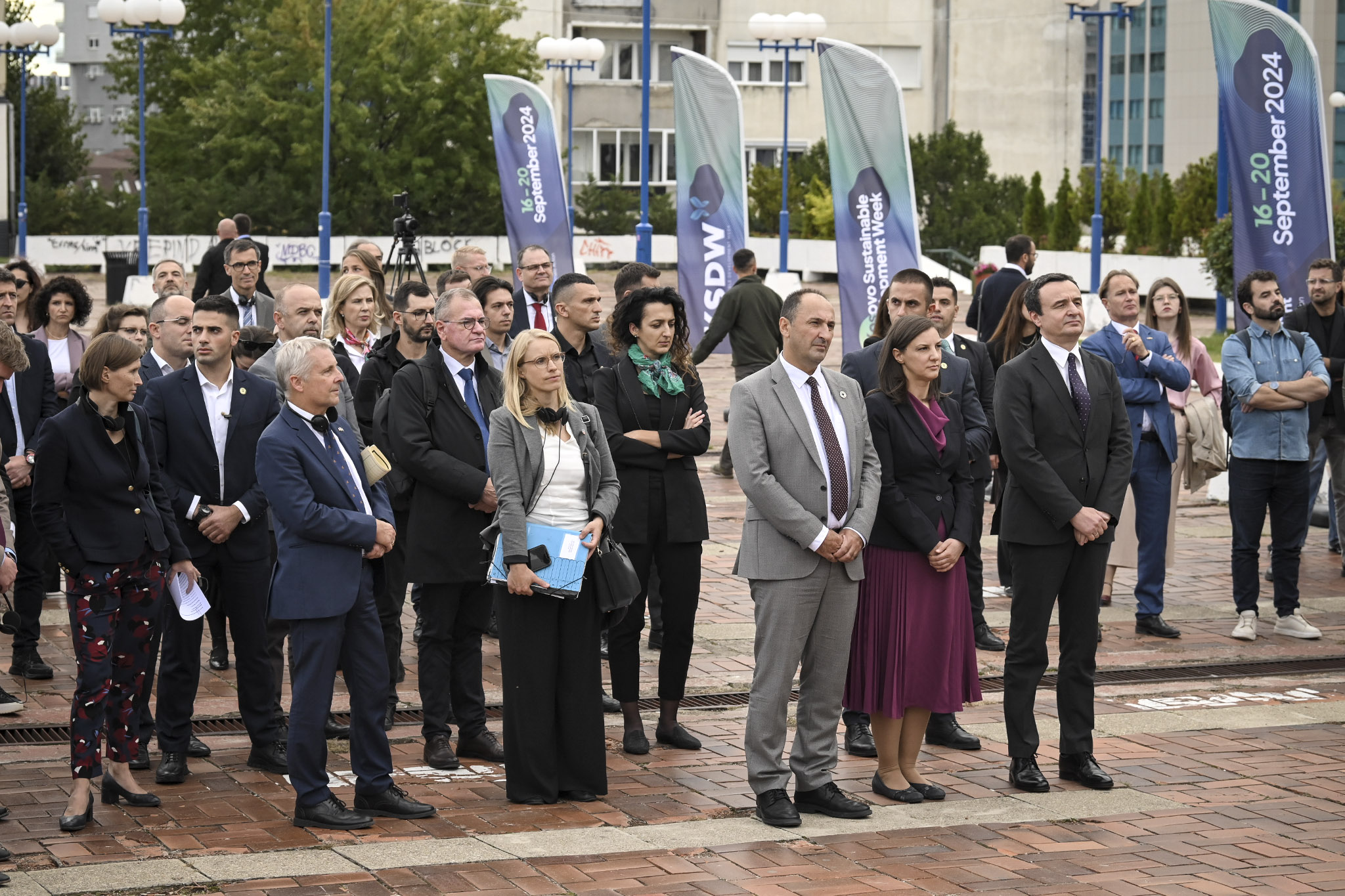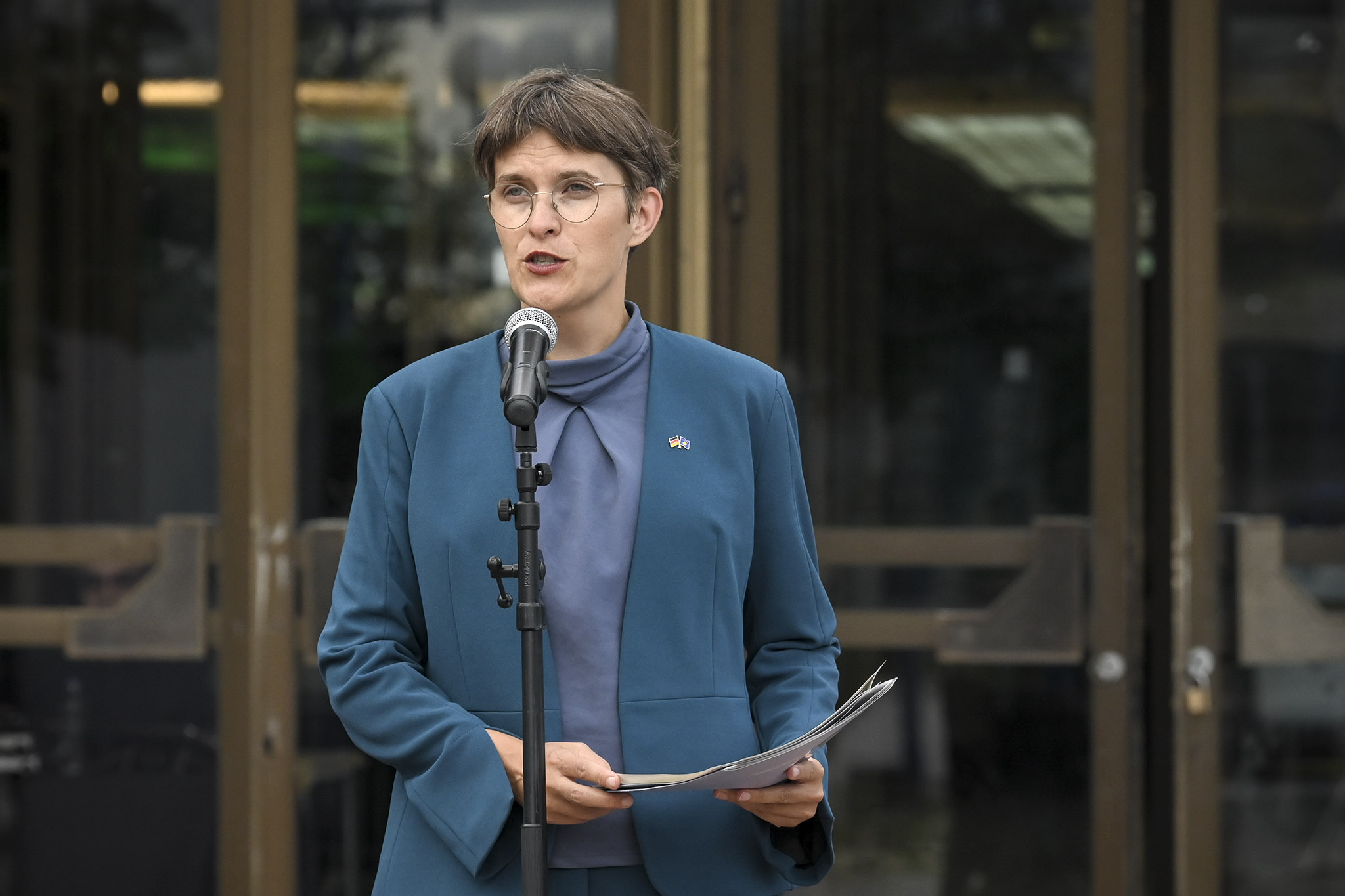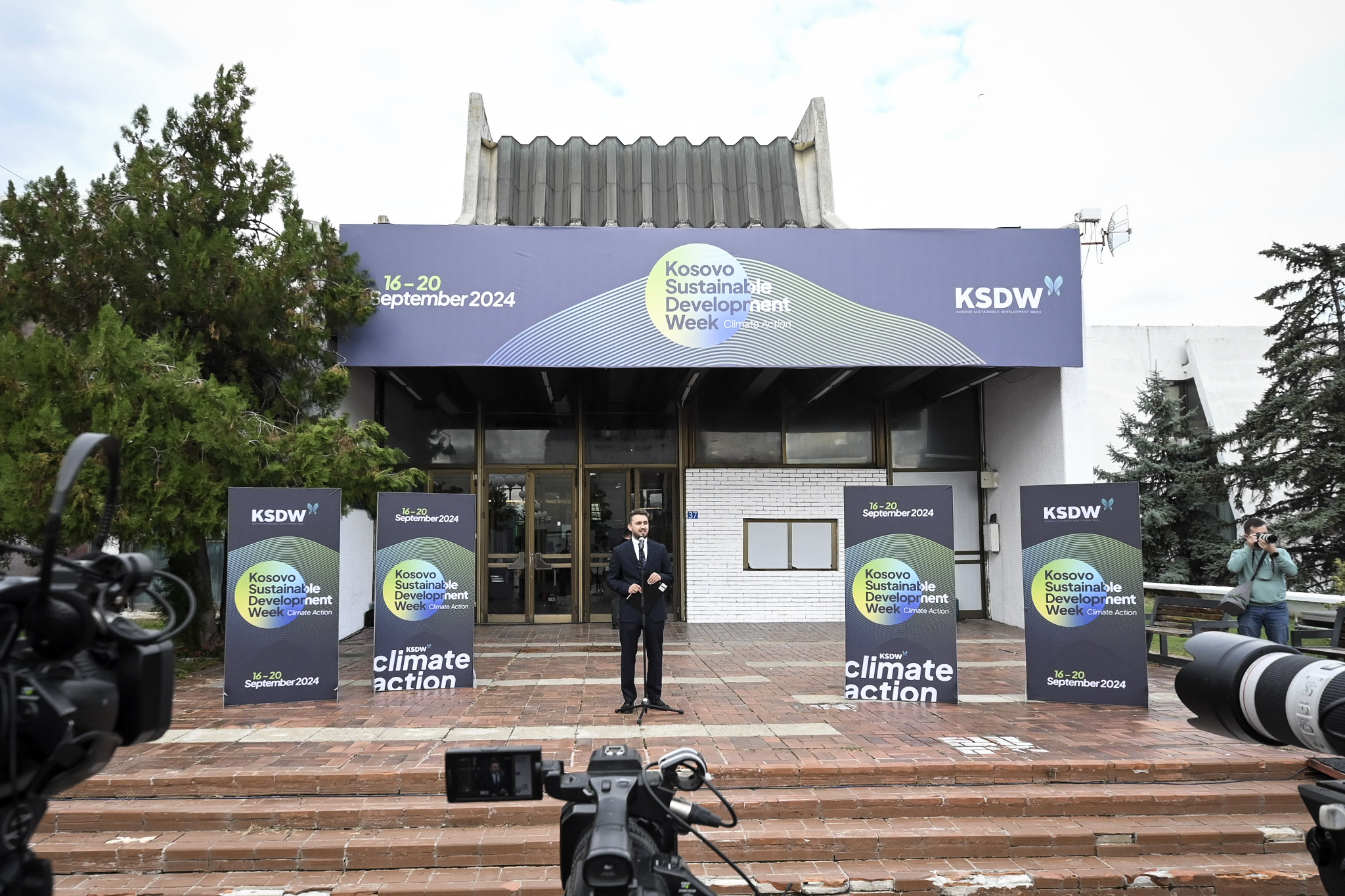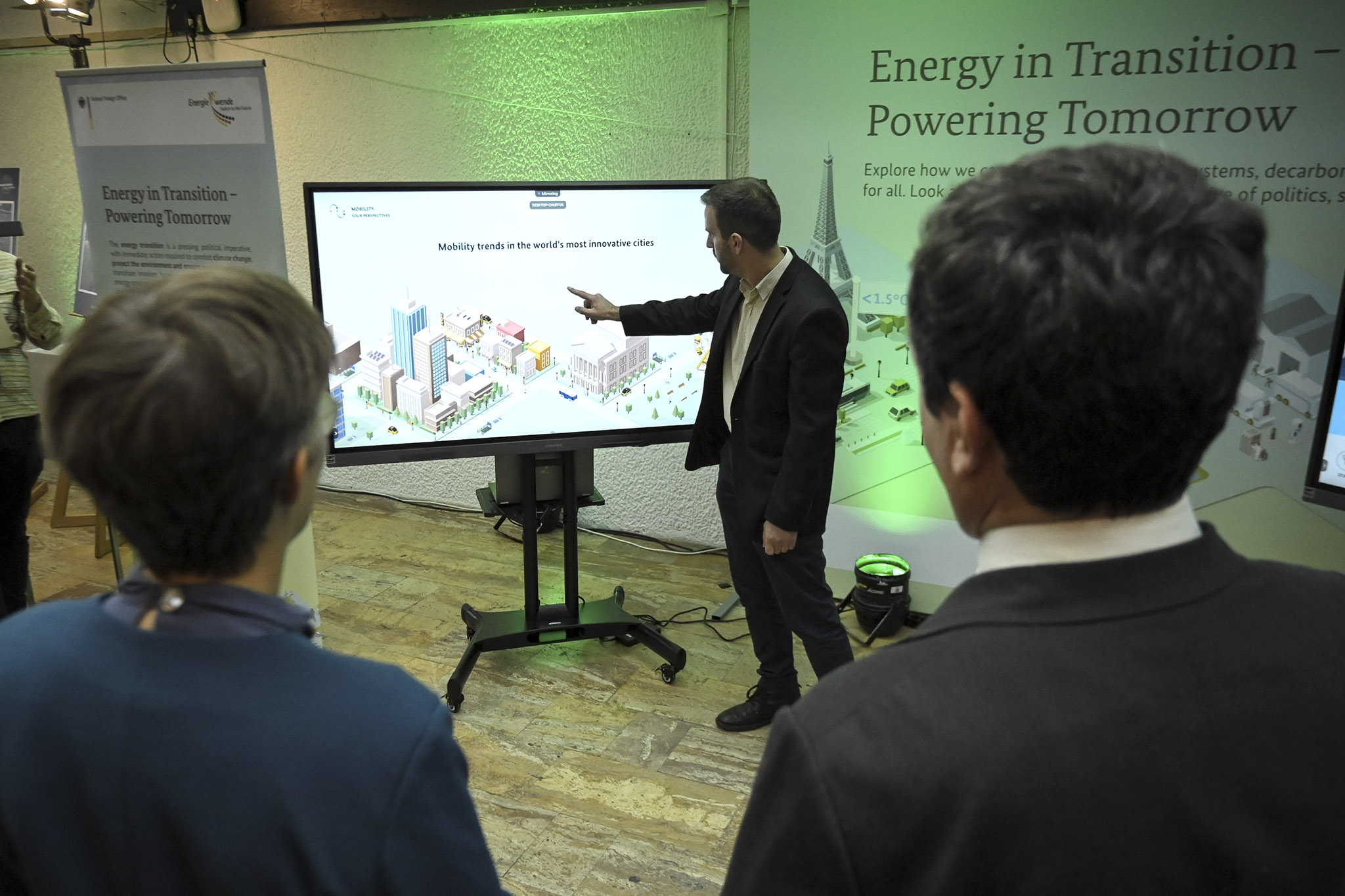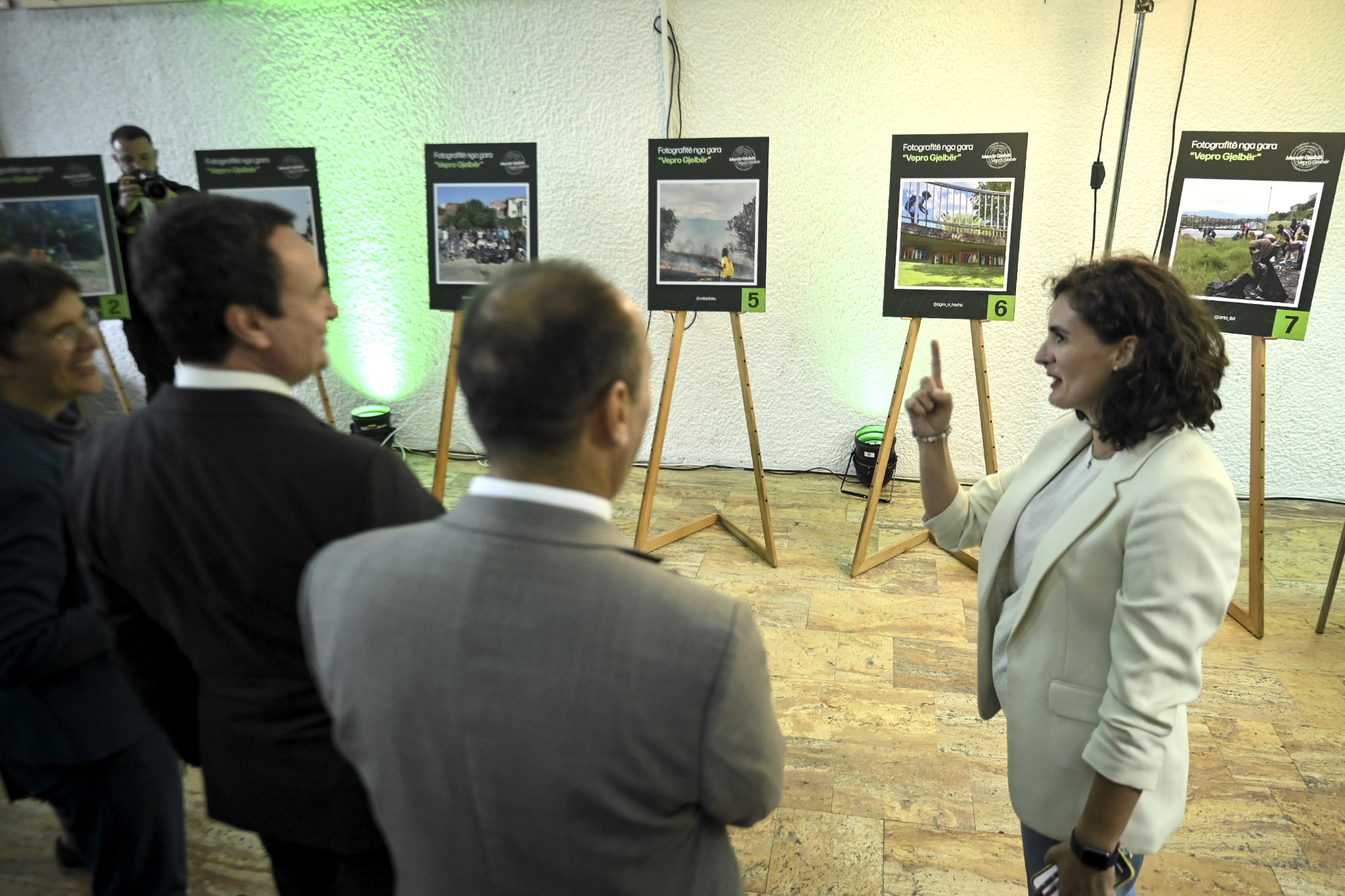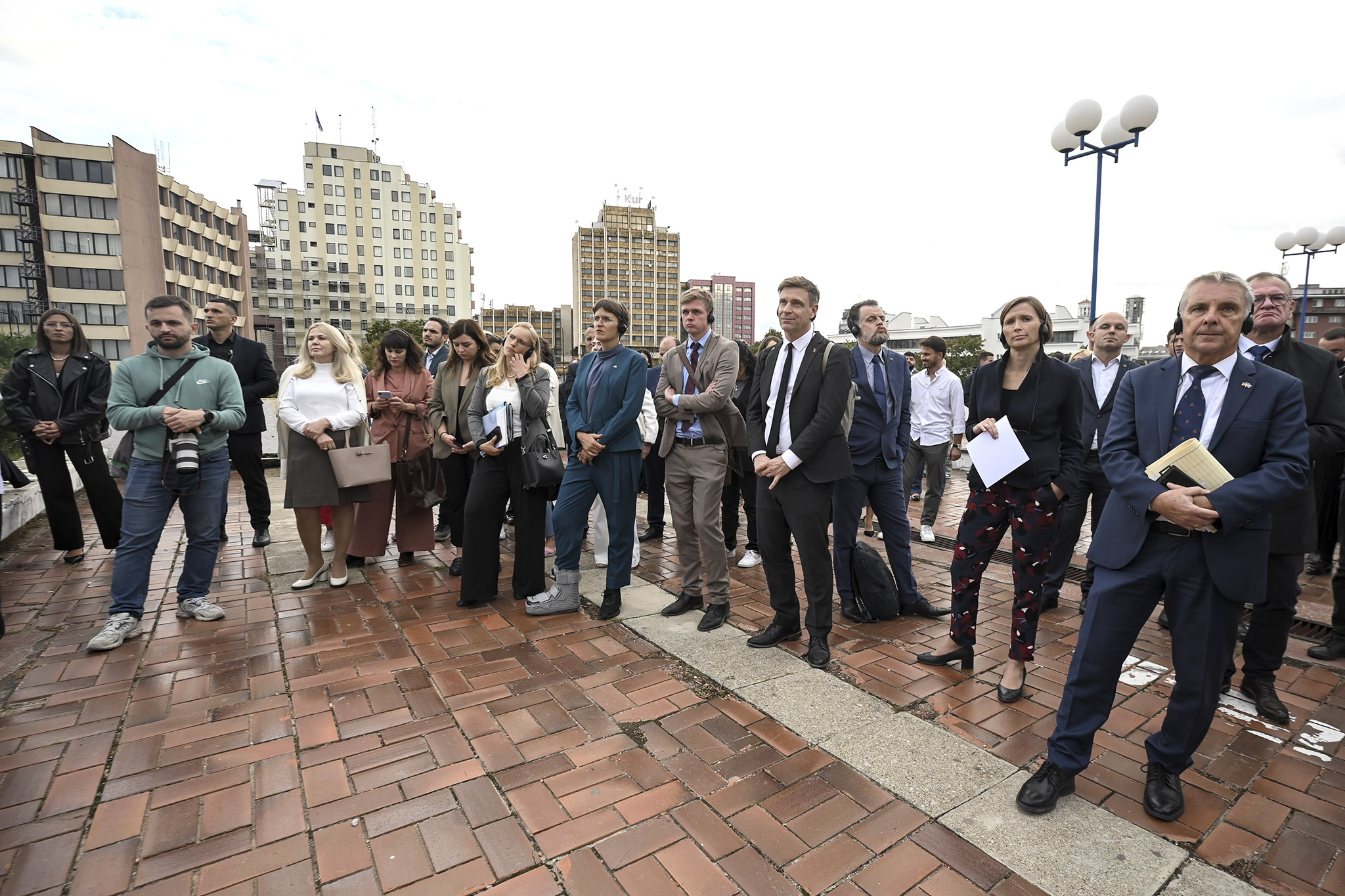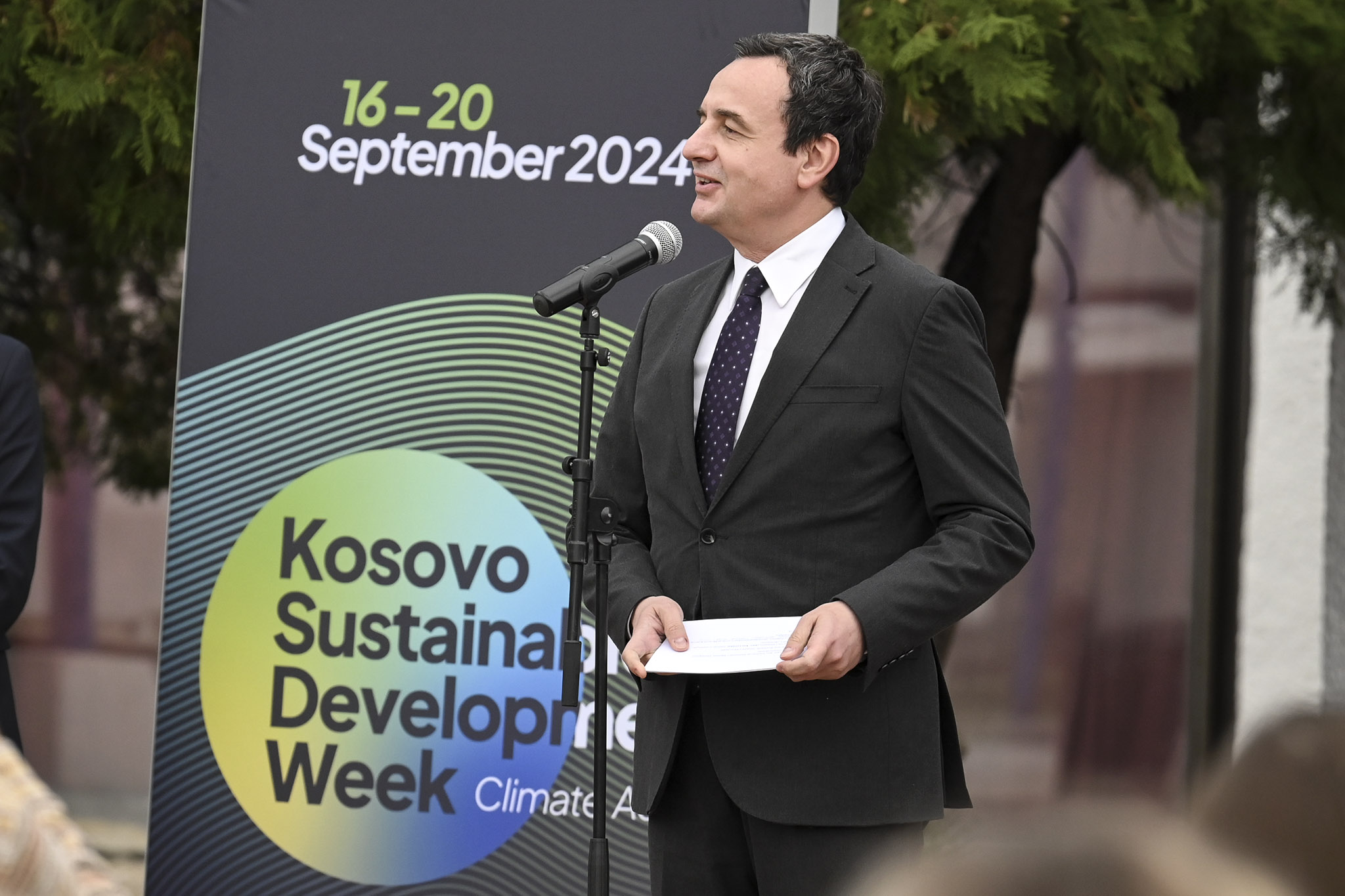Prishtina, 16 September, 2024
The Prime Minister of the Republic of Kosovo, Albin Kurti, during the afternoon participated in the opening of the Sustainable Development Week of Kosovo, accompanied by the Minister of Environment, Spatial Planning and Infrastructure, Liburn Aliu and the Minister of Economy, Artane Rizvanolli.
At the beginning of his speech, Prime Minister Kurti said that the Republic of Kosovo, throughout the last years, has made great progress in the energy transition and the climate agenda, showing the vision and great commitment for a sustainable future.
In addition to institutional support, Prime Minister Kurti also spoke about investments in the construction of renewable capacities, where he emphasized that the construction of 950 megawatts of renewable energy through competitive projects is planned. He singled out the organization of the solar energy auction with a capacity of 100 MW as an example of success, and added that he expects the same success for the competing projects for 150 MW of wind.
Although Kosovo is not a member of the United Nations Framework Convention on Climate Change (UNFC), the prime minister indicated that concrete actions have been taken to contribute to global climate efforts through the voluntary Nationally Determined Contribution (NDC). In this regard, the main goal is to reduce 8.95 million tons of carbon dioxide equivalent by 2030, which represents a reduction of 16.3% compared to 2016 emission levels.
In front of those present, the prime minister emphasized that one of the most innovative projects in the region and beyond is Solar4Kosovo, through which central heating from solar energy will be provided for 60,000 citizens, and 100 MW of solar energy for KEK, making it part of the green transition.
Further, the Prime Minister emphasized that in March of this year, Ministers Rizvanolli and Aliu, and the Minister of State for Europe and Climate of Germany, Ana Lurhman, who was also present today at the opening of the Week for Sustainable Development, signed the Climate Partnership and of Energy Transition. This is a bilateral agreement which will further strengthen the common objectives in these fields and the support of the German state in the field of energy.
Meanwhile, regarding climate adaptation, the prime minister said that the Climate Change Adaptation Strategy, which is being drafted with the help of UNDP and USAID, will help build capacities to deal with floods and droughts, as well as prioritize investments in water reservoirs and irrigation infrastructure. As he described this as a key priority for Kosovo.
Furthermore, through our cooperation with international partners, and especially with the German Government, which enabled participation in COP27 and COP28, the Prime Minister declared that we will continue to lobby for Kosovo’s inclusion in global climate mechanisms and for access to international financing, which are important to the success of these and our other projects.
“More than 50% of our priority projects in the environment sector are focused on climate adaptation measures, including building water reservoirs and dealing with floods and droughts. Feasibility studies for the construction of reservoirs are already in progress and the construction of these reservoirs is critical for water supply for the population as well as for agriculture,” he said.
At the end of his speech, the prime minister explained that the flood risk mapping project, carried out with LiDAR technology, enables better prediction of sensitive areas and taking appropriate measures to protect our entire territory from flood risks.
“Together, we will ensure that Kosovo is a more livable, stable and safe country for future generations,” Prime Minister Kurti concluded.
After the introductory words, Prime Minister Kurti with the ministers and the attendees visited the competitive exhibition with the motto ‘Go green’, the green corner with VR as well as other activities that will take place within the framework of the Sustainable Development Week, as well as held a media conference by the ministers present, the Minister of Economy, Artane Rizvanolli and the Minister of Environment, Spatial Planning and Infrastructure, Liburn Aliu.
Prime Minister Kurti’s complete speech:
This from September 16th to 20th falls to be a week without a weekend, which means that it is a working week and I have the honor and pleasure to be at its opening together with the two ministers, the Minister of the Environment , Spatial Planning and Infrastructure, Liburn Aliu, and with the Minister of Economy, Artane Rizvanolli.
And on this occasion, I especially wanted to greet Ana Lurhman, the Minister of State for Europe and Climate of Germany,
Then the lady, Eva Palatova, deputy ambassador of the European Union Office in Kosovo, as well as the honorable ambassadors Westerlund, Rohde and Bovern from Sweden, Germany and the Netherlands.
Dear attendees,
Ladies and gentlemen,
It is a pleasure to welcome you today to the Sustainable Development Week of Kosovo.
This week is a unique opportunity to show our commitment to a green and sustainable Kosovo. In particular, I support Mr. Luhrmann’s statement about the unique relationship that Kosovo has with Germany, and especially for its continuous support in this strategic partnership in the climate and energy fields.
The Republic of Kosovo, throughout the last years, has made great progress in the energy transition and the climate agenda, showing our vision and commitment to a sustainable future.
While the focus is often on building new clean capacity, we’ve made sure to think one step ahead: how best to use it? As a result, we have started with the energy storage capacity project of 340 MWh through the Millennium Challenge Corporation grant. These capacities are the highest per capita in the world!
Furthermore, as long as the interest in building renewable capacities is in the interest of all parties, we have thought a step ahead: how can we make sure that the capacities we build have the citizen of the Republic of Kosovo at the center? As a result, we plan to build 950 megawatts of renewable energy capacity through competitive projects.
The first among them, with which we set an example of success for the entire region, is the solar energy auction with a capacity of 100 MW. This auction has attracted the interest of consortia of world-renowned companies, who have competed against each other in a process that all participants have described as fair, transparent and equal. As a result, the winning consortium has given the final price of 48.88 EUR/MWh, or 35% lower than the ceiling price we set at the beginning, thanks to the competition.
We expect the same success for the competing projects for 150 MW of wind, twice the 75 MW we are currently working on and which will be launched soon, as we are working on them with the same zeal and dedication.
Throughout this journey of decarbonization and the just transition, Germany has stood by us as a key partner. In March of this year, Ministers Rizvanolli and Aliu and Mr. Luhrmann signed the Climate and Energy Transition Partnership, in the new bilateral agreement which will further strengthen our common objectives in these areas and the support of the German state in the field of energy.
This is just the latest in the continued and highly valued support of the German Government and German investment towards our energy transition. Through GIZ, beyond the technical support in designing support policies for citizens, we are also happy for the support they have given to promote the role of energy efficiency.
On the other hand, one of the most innovative projects in the region, and beyond, is Solar4Kosovo, through which central heating from solar energy will be provided for 60,000 citizens, and 100 MW of solar energy for KEK, thus making it part of green transition. In addition to the institutional support, among the first investments in renewable resources in our country, the wind park with a capacity of 105 MW, is a co-investment worth 170 million euros, again with Germany.
Everyone remembers the inauguration of 27 turbines together with the Minister of Foreign Affairs of Germany, Annalena Baerbock, in the cold winter of 2022.
But our commitment to the climate does not end there. Although Kosovo is not a member of the United Nations Framework Convention on Climate Change (UNFCCC), we have taken concrete actions to contribute to global climate efforts through the voluntary Nationally Determined Contribution (NDC). Our goal is to reduce 8.95 million tonnes of carbon dioxide equivalent by 2030, which represents a 16.3% reduction compared to emission levels in 2016. This commitment is indicative of our commitment to contribute to the fight against climate change, even though we are excluded from international climate finance mechanisms.
Climate security is an essential challenge for our country. The Southeastern Balkans is one of the hot spots of global warming, and Kosovo is vulnerable to extreme climate events such as floods and heat waves. In 2021 and 2023, floods caused significant damage, exceeding 30 million euros, while extreme temperatures are becoming more frequent, with projections showing that by the end of the century we could have up to 39.2 days with temperatures above 35°C, every year.
For this reason, climate adaptation is a key priority for Kosovo. The Climate Change Adaptation Strategy, which is being drafted with the help of UNDP and USAID, will help build capacity to deal with floods and droughts, as well as prioritize investments in water reservoirs and infrastructure. irrigation.
More than 50% of our priority projects in the environment sector are focused on climate adaptation measures, including building water reservoirs and dealing with floods and droughts. Feasibility studies for the construction of reservoirs are already in maturity and the construction of these reservoirs is critical for water supply for the population as well as for agriculture.
By 2050, we predict that four of Kosovo’s five water basins will face water stress, and this is why investments in water resources are critical to our future. Also, the risk of forest fires is increasing; in 2022 alone, 473 forest areas were affected by fires, highlighting the need for increased forest management and protection. In this direction, we intend to increase the forest cover of the territory of Kosovo and strengthen the institutions for preventing and extinguishing fires.
Our flood risk mapping project, realized with LiDAR technology, is enabling us to better predict sensitive areas and take appropriate measures to protect our entire territory from flood risks.
All these interventions are very expensive. Our estimates show that in order to achieve a level of security and stability against climate change, more than 1 billion euros are needed for Kosovo to be among the most livable countries in the region. This funding is essential for improving infrastructure and for facing future climate challenges.
Through our cooperation with international partners, and especially with the German Government that enabled us to participate in COP27 and COP28, we will continue to lobby for Kosovo’s inclusion in global climate mechanisms and for access to international funding, which are important for the success of these and our other projects.
Together, we will ensure that Kosovo is a more livable, stable and safe country for future generations.
Thank you, and I wish everyone a fruitful discussion during the Sustainable Development Week in Kosovo.
Last modified: September 18, 2024

